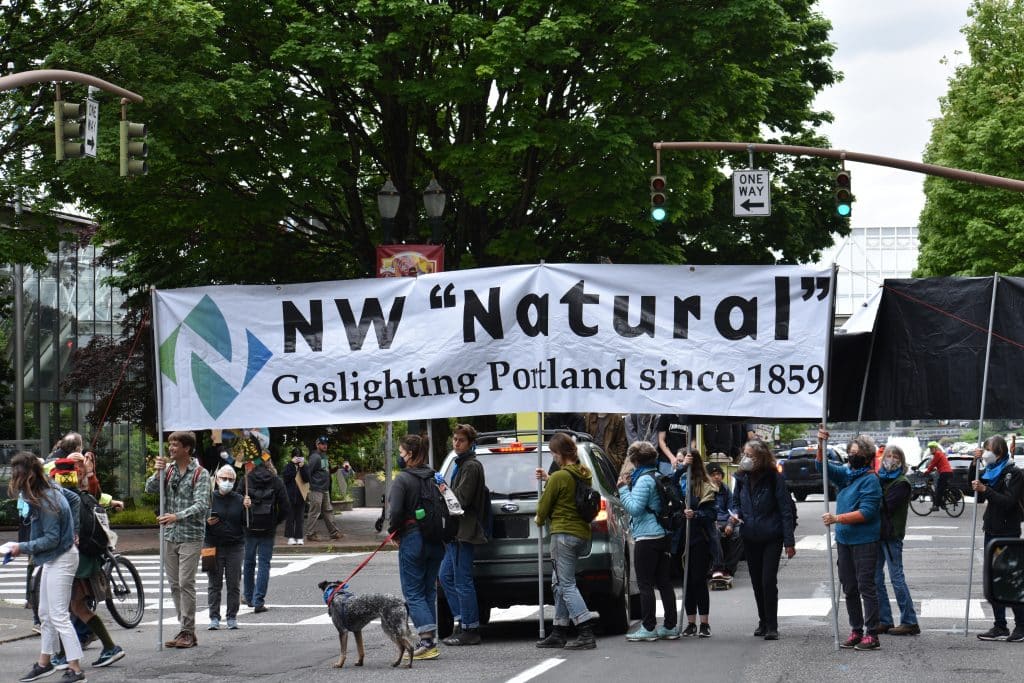A speedy transition to electric heat pumps in homes and businesses in Oregon could translate into lower utility bills and faster reductions in greenhouse gas emissions, according to a new report.
Those findings bolster calls from environmental groups, who are asking state regulators to end consumer subsidies that allow utilities to expand gas infrastructure.
A June report from Synapse Energy Economics, commissioned by the Sierra Club, found that a rapid transition to electric heat pumps in Oregon would cut household energy bills, reduce greenhouse gas emissions, and provide savings for the electricity system as a whole. Heat pumps, despite their name, offer both heating and air conditioning, and are widely seen as key to replacing oil and gas furnaces and helping decarbonize residential and commercial buildings.
Pollution from residential and commercial buildings in Oregon currently makes up roughly 35 percent of the state’s greenhouse gas emissions – largely the result of burning gas for heating and cooking. The report compared two hypothetical scenarios in which 100 percent of appliances sold to Oregon homes and businesses were electric, perhaps due to a ban on new gas connections, for example, or a mandate for all-electric construction. The first scenario analyzed zero-emissions appliance sales beginning in 2030, and the other beginning in 2025. Both scenarios would be ambitious, but the study found that the faster route not only provided more climate benefits, but also saved more money. Switching to all-electric appliances by 2025 would result in $1.7 billion in system-wide savings by 2050, compared to $1.1 billion in the 2030 scenario.
For individual households, the story is similar. The average fully electric Portland household would save about $161 more per year on utility bills than a household that uses a mixture of electricity and gas. A household in Bend, Oregon would save an average of $192 in the all-electric scenario compared to a household that still uses some gas.
“We know that the transition away from fossil fuel appliances for heating has to happen to avoid the most catastrophic consequences of climate change – but even if you look at this issue purely from an economic perspective, transitioning our homes off of polluting fuels like methane gas is still the right decision for Oregonians,” said Dylan Plummer, senior campaign representative for the Sierra Club.
The findings also strengthen the argument made by a coalition of environmental groups opposing a rate hike request filed by NW Natural, Oregon’s largest gas utility, which is currently being deliberated by the Oregon Public Utility Commission (PUC).
DeSmog previously reported on NW Natural’s rate request, which would saddle Oregonians with a 12 percent increase in their gas bills, in part to cover the costs of misleading advertising that promotes gas use, millions of dollars to shareholders and executives, and the campaign to promote gas in kids activity books in Oregon schools.
As part of the rate request proceedings, a coalition of environmental groups are also calling on the PUC to scrap a longstanding “line extension allowance,” which allows NW Natural to pass along the cost of new connections to existing customers. This means that ratepayers subsidize the ongoing expansion of the gas system.
Risk of ‘Stranded Costs’
Line extension allowances are common practice among both electric and gas utilities around the country. The argument for them has been that a larger customer base will benefit all customers as a whole by spreading out the cost of investments in infrastructure. But it is “completely at odds with state and federal decarbonization goals that require a shift away from gas,” the Colorado-based think tank RMI said in a report last year.
A coalition of environmental and community advocacy groups in Oregon, including Coalition of Communities of Color, Climate Solutions, Verde, Columbia Riverkeeper, Oregon Environmental Council, Community Energy Project, and Sierra Club, are formally asking the PUC to end NW Natural’s line extension allowance. They argue that connecting more people to gas infrastructure not only jeopardizes climate goals, but heightens financial risk to existing ratepayers since it exacerbates the challenge of decarbonizing residential and commercial buildings.

“[T]he Commission’s best method of protecting existing ratepayers is to stop encouraging the addition of new customers to the gas system,” said Nora Apter, the climate program director at the Oregon Environmental Council, in testimony to the PUC. Apter called for the utility commission to end the line extension allowance.
High gas prices, advances in electric heat pumps, and Oregon’s climate policies add up to a “very real risk that new investments in the gas system could indeed become stranded costs in future years,” Ed Burgess, senior director at Strategen Consulting, testified to the commission.
Oregon’s gas utilities are required to slash greenhouse gas emissions in half by 2035, and experts say very big questions remain about how gas utilities will comply.
“We don’t know if the utilities can reduce their carbon emissions consistent with state requirements. Growing those emissions by adding thousands of new customers each year seems irresponsible,” Bob Jenks, executive director of the Oregon Citizens’ Utility Board (CUB), a ratepayer advocacy group, wrote in a post in May. “Potentially we are taking a problem we don’t know how to solve and making it worse.”
NW Natural has tried to position itself as a climate leader, and has heavily promoted its decarbonization strategy, which hinges on scaling up methane gas captured from landfills and agricultural feedlots (so-called “renewable natural gas,” or RNG), gas-dependent blue hydrogen, and switching to more efficient gas furnaces and gas heat pumps in homes and businesses. Critics cite that all of these concepts are expensive, and some, including renewable natural gas and blue hydrogen, may never prove to be economically competitive at the scale needed to replace gas across the entire residential and commercial buildings sector.
The company’s decarbonization strategy makes one thing crystal clear: NW Natural’s business model, now and for the foreseeable future, is to sell methane gas. NW Natural did not respond to questions from DeSmog.
In a statement to DeSmog, Oregon’s utility commission said it is carefully reviewing input from stakeholders, and will hold a public hearing on the future of gas in the state on July 12.
Many Governments Phasing Out
Other states are also reconsidering line extension allowances. The California PUC has proposed eliminating its line extension allowance altogether, while regulators in Colorado and Washington have signaled an interest in reforming gas utility allowances. Still, ratepayer-funded subsidies to grow gas infrastructure remain ubiquitous. RMI estimates Californians pay $100 million a year for gas expansion, while New Yorkers subsidize $200 million annually.
Meanwhile, separate from the regulator process, climate advocates have also called on governments to stop the growth of the gas system. An increasing number of governments are heeding those calls — nearly 80 governments around the country, most at the municipal and county level, have committed to phasing out gas in new construction.
The city of Eugene is holding a meeting on July 25 that could result in initiating a ban on gas hookups in new residential and commercial buildings that could take effect as soon as next year. A study conducted by RMI for the city of Eugene found that new all-electric homes would save $208 annually on household utility costs and would both lower greenhouse gas emissions and also lower upfront building costs by an average of $1,600 because there would be no need for new gas infrastructure.
NW Natural has pressed Eugene’s city council not to support a gas hookup ban, and has also run ads in the Eugene area, warning customers about the prospects of “forced electrification.”
But as advocates note, the policy trajectory away from fossil fuels is clear, so subsidizing the growth of the gas system no longer makes sense. “The question for the Commission is — why should existing customers be expected to pay for unnecessary expansion of the gas system through [line extension allowances], when it is unlikely that the customer base will continue to grow to justify those additional infrastructure costs?” Brian Stewart, founder of Electrify Now, said in the testimony.
Subscribe to our newsletter
Stay up to date with DeSmog news and alerts







